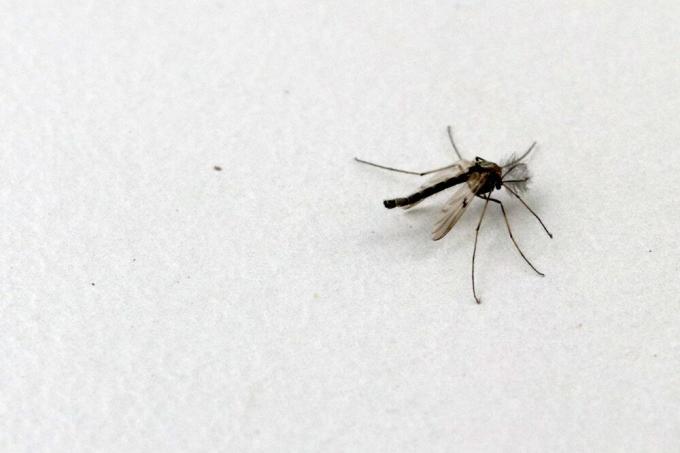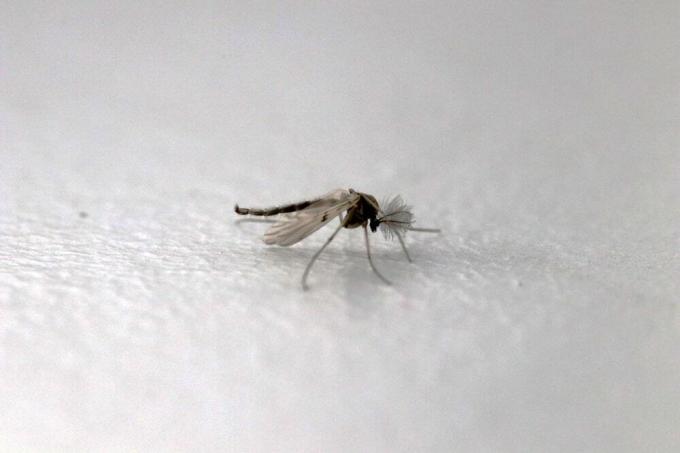

Table of contents
- winter myth
- wintering
- winter quarters
- hibernation
- cold protection
- organ functionality
- food supply
- Awaken
- end of winter
- Conclusion
Contrary to popular belief, mosquitoes (Nematocera) hibernate, although not all. This depends above all on their sex and the respective stage of development. While the males die in autumn, the females start preparing for winter from around mid-October. They have already laid their eggs, which, together with the larvae, are waiting for the next summer, even in the freezing cold. Sometimes people are not safe from a mosquito bite, even when the temperature is below zero. The following explains exactly how and why mosquitoes spend the winter.
winter myth
It is often assumed that mosquitoes only survive in warm climates. This is due to the fact that the number of Nematocera usually decreases significantly in autumn. This is true so far, but that's because the male mosquitoes die and only the females remain. These are also the ones that sting. While the male animals feed themselves purely with plant juices, the females need above all after fertilization additional protein, which they from human or animal blood soak up.
In some places in Siberia, the female mosquitoes even survive temperatures below minus 50 degrees Celsius. Depending on the development of the mosquito, they have different strategies to survive the cold season alive, so that they can actively go on a bloody search for food the following spring.
The number of stinging insects is therefore less dependent on the cold outside temperatures and more on spring. The wetter it is, the more they multiply and swarm en masse through the summer and Germany's gardens or homes.
wintering
Mosquitoes have three strategies that allow them to survive the winter, even in extremely sub-zero temperatures:
- as eggs
- as larvae
- as a female adult mosquito
In the last act of the male mosquitoes living in late summer or autumn, they still fertilize the females. These usually lay their eggs where the larvae that develop from them are able to survive in winter.
Eggs and larvae have excellent chances of surviving over the winter, as they hardly offer a target for frostbite due to the low water content in winter. The adult mosquitoes then go in search of their suitable winter quarters.
winter quarters
From autumn onwards, the mosquitoes look for a place to hibernate. They prefer cool, dry winter quarters that are safe from predators, which is why they like to be open, especially in autumn Use windows and doors to create an optimally suitable wintering place in the cellar, garage, cattle shed or garden shed find. There they fall into hibernation in cold ambient temperatures. In the water, the eggs usually survive the winter cold in mud or mud, for example from a pond. They also find optimal winter quarters in rain barrels. Here they are deposited by the mother animals.

The larvae settle below the water surface. Their breathing tube extends through the water surface and allows them to take in oxygen even when the water is frozen. as long as the ice only forms afterwards. However, if the water is completely covered with ice before the larvae can raise their breathing tube, they will not survive long. Otherwise, like adult mosquitoes, they spend the cold winter months in hibernation. For the eggs too, a completely frozen body of water means certain death from a lack of oxygen.
Tip:
To curb a mosquito infestation the following year, freeze water tanks and, in the case of ponds, just almost to the bottom Use reeds that reach the bottom of the pond, which freeze all around, but oxygen for other ecologically valuable animals under water offer.
hibernation
When outside or ambient temperatures drop to five degrees Celsius or less, mosquitoes and their larvae enter the hibernation stage.
cold protection
The body of the Nematocera gives the insects a special protection that prevents them from freezing to death. As cold-blooded animals, their bodies react to the cold temperatures by also reducing their own body temperature. At the same time, mosquitoes, as they are also called, excrete more body fluids in order to minimize the possible potential for frostbite. In addition, more water binds with protein, which consequently also increases the salt content in the body. In addition, a natural cold protection based on a glycerin forms in the blood, as is also used in water antifreeze, for example in vehicles. This means that the blood cannot freeze, as is the case, for example, with dogs, which are warm animals.
organ functionality
During hibernation, organ activity decreases with decreasing body temperature. The body system shuts down evenly into a kind of standby mode and only works with a minimum of activity so that important organ functions keep the body alive. This also includes the body's mobility, which leads to complete solidification as the ambient temperature decreases. Due to the shut down system with a flattened heart rate and respiratory rate as well as an inability to move, correspondingly little energy is consumed.
food supply
The mosquitoes take additional energy for the hibernation from late summer through increased food intake. This is stored in a fat depot, which can be recognized by the yellowing of the rear part. From this, the mosquito body supplies itself with the energy it needs, which enables organ functionality during hibernation.
Awaken
If the temperatures rise to between eight and ten degrees Celsius, mosquitoes and their larvae wake up again. This costs them additional energy, which causes them to forage for food even in winter and to pursue their blood stinging here. So it is quite possible that you are not necessarily safe from a mosquito bite in December or January.
It also happens from time to time that mosquitoes do not even hibernate because they have chosen a winter quarters that is too warm. As a rule, however, they do not survive the winter season.
Tip:
If you occasionally warm up closed rooms to over ten degrees Celsius, you tear the mosquitoes out of their hibernation. Due to the increasing energy consumption, there is a greater chance that the mosquitoes that spend the winter there will no longer prick you in the following year.
end of winter
Depending on how cold or warm the months between February and April are, the early spring is the greatest danger for this insect species. It is well known that winter can hit again at the official start of spring with icy temperatures and frosty temperatures are even possible up to the ice saints in May. While the mosquito eggs are less concerned about this, the mosquitoes and their larvae have far more survival problems here. Short, abrupt drops in temperature do not allow their body temperature to equalize evenly once they have awakened from hibernation. This means that their protection against the cold cannot react so quickly to unexpected frost and the risk of freezing to death increases immensely.

However, this is not the case for mosquito eggs. A sudden freeze doesn't bother them because they don't have any water or blood to freeze.
Since female mosquitoes can lay up to 300 eggs several times in a few days and start multiplying in early spring, the Mosquitoes are definitely not threatened with extinction, even in spite of a potentially high death rate due to renewed freezing temperatures after the hibernation.
Conclusion
Only female mosquitoes and their eggs and mosquito larvae overwinter, while the male conspecifics die before the onset of winter. Most of these insects also survive freezing temperatures in a hibernation or the eggs are almost completely frost-resistant. A warm, damp spring offers excellent conditions for masses of these stinging pests, as the winter mosquitoes can multiply optimally here. The tips mentioned help to make winter more difficult for these females and their offspring in order to prevent or at least significantly minimize mass reproduction in the following year.
 garden editorial
garden editorial I write about everything that interests me in my garden.
Learn more about garden animals

Mice species in Germany: 20 native mice
In Germany, not only field mice and house mice are native, but also some other species that you often don't see at all or only very rarely. Here we present 20 native mouse species.

Feeding squirrels in winter: what can you feed? What not?
In winter, prudent gardeners prepare a richly laid table for birds. Squirrels are usually left behind. In fact, the funny climbing artists depend on our help in the harsh winter. You can find out here how to feed squirrels in winter in an exemplary manner.

How do ladybugs hibernate? Do they hibernate?
Ladybugs (Coccinella) are very valuable to nature. From autumn onwards, they can usually be seen in flocks, setting out to protect themselves from the cold winter temperatures. Depending on the species, the ladybugs spend the European winter time differently. Learn how and where that is.

How and where do butterflies hibernate? All information about winter
When it starts to get cold outside and the food supply decreases rapidly, it is also high time for butterflies to take precautions for hibernation. Exactly which ones these are depends on the butterfly species in question, because as diverse as they are, they also have different strategies for surviving the winter.

How do snails overwinter? Where nudibranchs cavort
Snails are among the most unwelcome plant pests, but they are important for nature. While poisons and traps make things difficult for the creeping companions from spring to summer, the cold temperatures hit in winter. Find out how snails survive the winter and where the pesky slug has its winter quarters.

Where and how do squirrels hibernate? Do they hibernate?
When winter comes, a special season begins for squirrels. At this time of year, bodily functions slow down. While this means hibernation for cold-blooded animal species, others survive the cold winter months by hibernating or hibernating. You should know how and where the squirrel spends this time and how you can help the rodents before the onset of winter.



